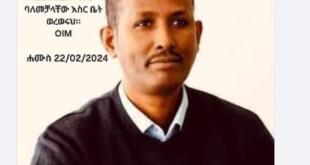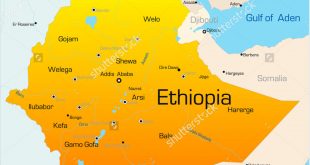By: Dejene Abdissa
When is the Ethiopian Government Empowered to Declare a State of Emergency under the Constitution?!?!
The Ethiopian government is empowered to declare a state of emergency under the constitution, “should an external invasion, a breakdown of law and order which endangers the Constitutional order and which cannot be controlled by the regular law enforcement agencies and personnel, a natural disaster, or an epidemic occur (Constitution of the Federal Democratic Republic of Ethiopia; Article 93: Emergency Proclamation).
The unrest in the central Oromia dates back to November 2014/15, when demonstrators opposed a government plan to expand the boundaries of Addis Ababa into the Oromia regional state. Farmers were particularly upset, worrying that they would lose their farms in the government’s notorious “land grab” policy. Those protests have claimed the lives of hundreds of people and still counting (Gebre-Selassie, 2016). In July 2016, another wave of protests began in the Amhara region when the government arrested members of the Welkait Committee, who were demanding the reversal of a 1991 decision by the ruling party to annex three districts of the Amhara region into the Tigray regional state. The inhabitants of these districts identify as ethnic Amhara and want to be reintegrated into the Amhara regional state, of which they have been a part for centuries; nothing more, nothing less. As a consequence, the Oromo and Amhara ethnic groups – who together constitute close to 70% of the total population – are deeply resentful about playing second fiddle. Naturally, this has been a deep source of political disaffection for vast numbers of the members of these communities.
The deadly protests that have rocked Ethiopia over the past several months in Oromia region; one of the largest region in terms of population, landmass and economic resource and in Amhara region; the second largest population number in Ethiopia finally, results in the declaration of a six month state of emergency, which stem from many regional and national grievances, most of which reflect a sense of economic and political marginalization by wide sections of the country. Moreover, the larger context for these protests, however, is the fact that for the last quarter century Ethiopians of various ethnicities have been subject to a system of governance whereby the Tigray People’s Liberation Front (TPLF): otherwise a ‘single party’, which represents a mere 6% of Ethiopia’s population, controls virtually all key levers of economic and political power. The TPLF, its cronies, party loyalists and their families control more than 70% of the modern economy, including Communications, Transport, Agriculture and the Defense Industry; what a greedy, mindless and selfish!?. Key political institutions, including Defense, Intelligence and Foreign Affairs, are similarly owned and operated by and for the benefit of the ruling ethnic clique, with as many as 98% of the top echelons of the military and intelligence forces being staffed by ethnic Tigrayans.
The declaration of the so called ‘state of emergency’ is nothing more than a comic show. There is nothing the regime was not doing before the declaration of the state of emergency that it is going to do now. It is well documented by credible human right organizations, such as Human Rights Watch and Amnesty International, that the regime arbitrarily arrests, search homes without a warrant, exercises extrajudicial killings, torture and a whole host of human rights violations. Then what is left now!? What different authority or power would be given to the security forces!? The declaration of the ‘state of emergency’ is a comedy, except we can’t laugh!
To mention just only one from many, the declaration of state of emergency includes restriction on access to information; these directives include:
- Prohibits access to Diaspora TV stations and other “similar linked terrorist media” such as US-based Ethiopian Satellite TV (ESAT) and Oromia Media Network (OMN).
- Enables government to “censor and block” radio and TV.
- Prevents opposition political parties from speaking to local or foreign media that has the potential to disrupt “the security, sovereignty and the constitutional order.”
Under the International Covenant on Civil and Political Rights (ICCPR), certain rights may be derogated under a state of emergency but must be tailored to the “exigencies of the situation,” while other rights may not be derogated under any circumstances. Under the African Charter on Human and Peoples’ Rights, no derogation of charter rights is allowed during a time of emergency (Human Rights Watch, 2016).
Human Rights Watch has grave concerns that Ethiopia’s state of emergency directive permits vague and over broad restrictions beyond those permitted under the International Covenant on Civil and Political Rights (ICCPR) that threaten basic rights to free expression, assembly, and association and may encourage violations of the rights to the security of the person, including arbitrary detention and torture. For example, violence has occurred in only two of Ethiopia’s nine regions, affecting less than half the country, yet the geographic coverage of the state of emergency is country-wide. As to duration, the state of emergency is for six months, the maximum permissible under the Ethiopian constitution, yet the government has not explained why the current situation warrants the longest possible period allowed by law. Regarding material scope, the restrictions on free expression rights, which include both content and forms of speech and protest, go are well beyond the “exigencies of the situation” to permit the silencing of peaceful expression and denial of access to information.
Even though, the Federal constitution was designed to empower the major ethnic groups of the country to form their own states as the main framework for their governance, none of the member states (with the sole exception of Tigray) have any real powers to take care of its internal affairs. At the same time, the ethnically based Federal system has left minorities trapped in their respective regions. They are treated as second-class citizens, lacking access to education, civil service employment, business licenses, bank loans and land leases on a nondiscriminatory basis. Even worse, they are liable to be expelled from regions in which they are considered “outsiders”.
According to Mamo (2016), the dictatorial Ethiopian government (TPLF) is a regime that has overstayed a welcome that it didn’t have in the first place. Twenty-five years of repression, polarization and institutional terror is the only mechanism that kept it on power. Now, the people of Ethiopia from all corners, age, religion, and identity have spoken in one choir: ENOUGH is ENOUGH! The declaration of the state of emergency is the last card all authoritarian regimes play while they are being shown the way out. In essence, the state of emergency is the last gasp of a dying regime to feed their-own self-deception and denial.
Down! Down! Woyane! Down! Down! TPLF! Down! Down! Dictatorial Ethiopian Government!




